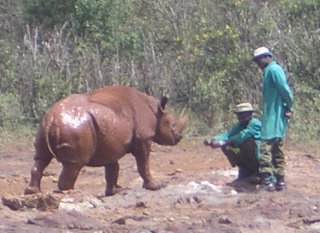"There is a certain pride in man that will give and give, but to come and accept is another thing." ~ Oswald ChambersAfter traveling 40 kilometers in two hours over washed-out roads and desert brush, we arrived late in the afternoon at the Masai village. Over a hundred Masai sat underneath a huge acacia tree, attired in their traditional garb of red and purple-flannelled cloaks. Their blank faces and our smiles masked uneasy expectations. The van doors rumbled open, connecting two worlds into one.
A few male leaders introduced themselves before leading us away from the crowd to a tree some distance away. The men had slaughtered two or three goats; a tremendous gift. They might as well have given us a piece of themselves, for livestock is the Masai's livelihood. We ate the tough meat and drunk the stank stew with gut and gusto.
Returning to the crowd, we were welcomed by the Masai women. They gathered in front of us, singing and dancing in a rhythmic chant. After a few minutes they invited us to join them. I suddenly realized the lens of my camera, while allowing me to see and record the events, prevented me from fully engaging the experience. I entered among the sea of stomping and singing women, slowly relaxing into the motion of bobbing heads and a slightly squat stance. In order to understand we must stand under and stand with, requiring great respect, much humbleness and a whole lot of fun.
Afterwards, all the men sat together in the shade of the tree, while the women sat together some distance away in the sun. Many people spoke, thanking our organization for coming and installing a borehole to provide water in a very dry land. Although the drilling had been completed, only the tip of the iceberg could be seen: a plugged pipe awaiting a pump. Our hosts had brought hundreds of plastic jugs, expectantly hoping us to turn on the pump. The protruding pipe jabbed into our symbol of cooperation as a dagger of miscommunication, dashing everything save hope.
Towards the end of visit, the women presented a beaded necklace to each visitor. One group member wanted to repay their generosity immediately, placing her safari hat on the Masai woman's head. While well intentioned, the action perhaps served to remedy the imbalance of gift-giving and cancel any perceived indebtedness. How quickly we define ourselves as the giver and them as the recipient!
Just as the women welcomed us, the men bid us goodbye. A dozen young men marched together, chanting and stomping in unison. Forming a semi-circle before us, each took his turn leaping to the beat. They invited me, a fellow young man, to join them. I had been quite comfortable to take pictures rather than give into dancing, yet relationship requires response. I accepted their invitation, jumping as high and as clumsily as any American tourist ever could.
For them a relationship had begun. For us a visit had ended. As an individual joining their group in ritual dances, I wanted the relationship to continue. I've expressed this desire to others by remembering names, asking questions, making eye contact, holding hands long after the handshake... Each time I meet someone, I can either accept or reject, be accepted or rejected. If I don't take the risk of being vulnerable and possibly indebted to another's generosity, the barriers to relationship remain intact. I believe this trust comes from a loving relationship with a living God.
I do not envy the people who come to Kenya for only a week or two. I relish in the opportunity to invest in relationships, and feel blessed to be invested in by others. In relationship, no longer do I ask what I can do to solve a problem, but what we can do. Mistakes are part of the game, and I pray for courage to see my faults and accept another's forgiveness. As an American, sometimes the biggest challenge is letting go of time, realizing relationships inevitably and necessarily take time away from me.
Being an American separates me from Kenyans. I have the freedom to do what I want when I want, yet I am alone to confront the hard times of life abroad. As time passes and I form relationships with others, my experience goes much deeper than individual freedom. As I let go of my freedom, Kenyans are waiting to lovingly embrace me. And it's deeply satisfying.
"The greatest blessing spiritually is the knowledge that we are destitute; until we get there Our Lord is powerless. He can do nothing for us if we think we are sufficient of ourselves." ~ Oswald Chambers***
I relied heavily on Anthony J. Gittins' Ministry at the Margins
in developing this newsletter, specifically his chapters, "Discovering Mutuality" and " A Place for Strangers."






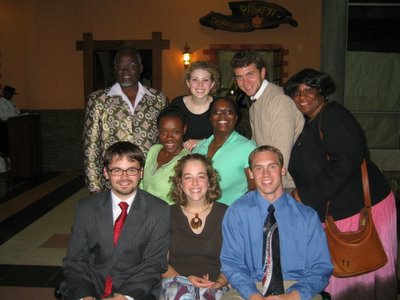

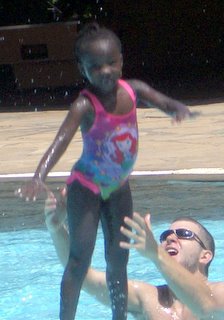 This past weekend the young adult volunteers took a vacation. We went to Mombasa, the large and somewhat historic Kenyan coastal city. After spending the morning walking around town with our unoffical guide Mohammed, we spent the afternoon at the Wema Center where Fiona works. The rest of the weekend was spent lounging on the beach, reading in our wooden beach chairs, playing with little ones in the pool (i.e. throwing them high into the air and not letting them drown- not an easy task, yet extremely fun).
This past weekend the young adult volunteers took a vacation. We went to Mombasa, the large and somewhat historic Kenyan coastal city. After spending the morning walking around town with our unoffical guide Mohammed, we spent the afternoon at the Wema Center where Fiona works. The rest of the weekend was spent lounging on the beach, reading in our wooden beach chairs, playing with little ones in the pool (i.e. throwing them high into the air and not letting them drown- not an easy task, yet extremely fun).


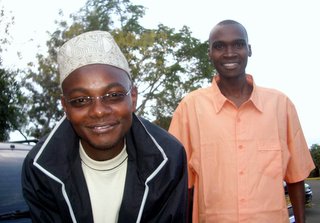

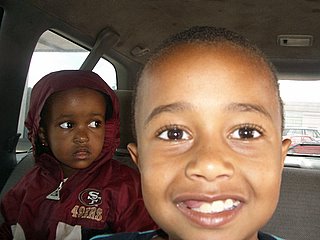





 A friend, Leora, and I went to Sheldrick Elephant Orphange, one of three like it in the world. From 11am-12pm each day, visitors can come and see these orphaned animals being trained to return to the wild. Poaching is still a very real problem in this area, with tusks cashing in around $1,000 per elephant. The Kenyan Wildlife Service has done a remarkable job and elephant populations have been on the rise since the late 70's. However, cuts in funding have decreased their capability to respond to the program. Through private initiatives like Sheldrick, baby elephants are nurtured and returned to the wild.
A friend, Leora, and I went to Sheldrick Elephant Orphange, one of three like it in the world. From 11am-12pm each day, visitors can come and see these orphaned animals being trained to return to the wild. Poaching is still a very real problem in this area, with tusks cashing in around $1,000 per elephant. The Kenyan Wildlife Service has done a remarkable job and elephant populations have been on the rise since the late 70's. However, cuts in funding have decreased their capability to respond to the program. Through private initiatives like Sheldrick, baby elephants are nurtured and returned to the wild. We learned a lot of fascinating information about elephants. Elephants are a lot like humans. They need a lot of attention, and there is always a keeper with one of the elephants, 24/7/365. Yes, each one sleeps with an elephant every night. They travel an average of 30 miles a day, drink up to 50 gallons of water and eat hundreds of pounds daily. Not being able to sweat, they use their thin, fragile ears to fan their bodies and cool off. They also suck out water from their stomachs with their trunks, using the water to spray their bodies and cool off. An elephant crosses its legs while standing in order to rest. They cannot jump but are known to be adept swimmers.
We learned a lot of fascinating information about elephants. Elephants are a lot like humans. They need a lot of attention, and there is always a keeper with one of the elephants, 24/7/365. Yes, each one sleeps with an elephant every night. They travel an average of 30 miles a day, drink up to 50 gallons of water and eat hundreds of pounds daily. Not being able to sweat, they use their thin, fragile ears to fan their bodies and cool off. They also suck out water from their stomachs with their trunks, using the water to spray their bodies and cool off. An elephant crosses its legs while standing in order to rest. They cannot jump but are known to be adept swimmers.